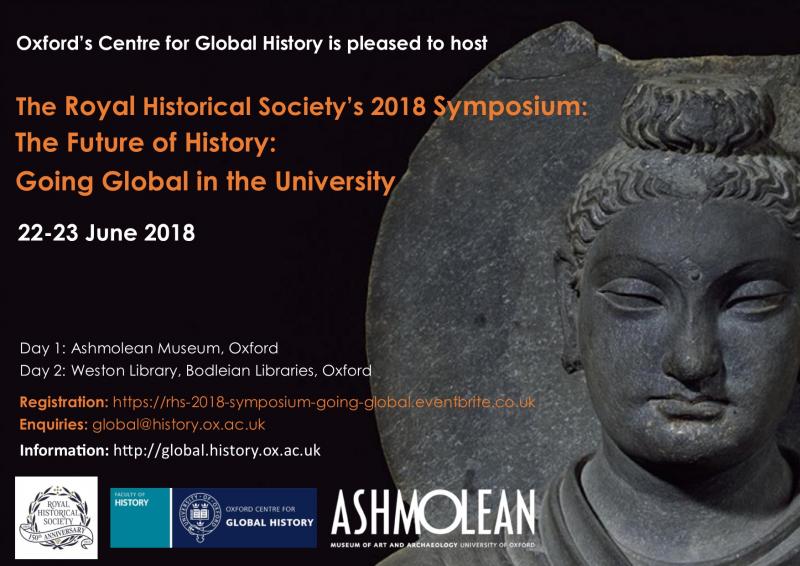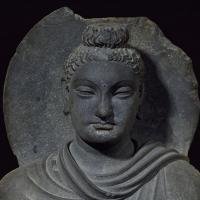The Royal Historical Society 2018 Symposium, 'The Future of History: Going Global in the University'

CLICK HERE TO REGISTER
NOTE: we are currently at full capacity for both days, please contact global@history.ox.ac.uk to be added to the waiting list.
The Royal Historical Society 2018 Symposium
'The Future of History: Going Global in the University'
22-23 June 2018 - Ashmolean Museum, Bodleian Library
The pedagogical boundaries that shape history university programmes reflect Western societies’ interest in the origins of modern culture and institutions, the characteristics of Western civilization, and relations between ‘the West and the rest.’ As a result, history departments are undergoing a transformation as they increasingly address the global turn and non-western histories alongside commitments to established themes and periodization.
In the 150th anniversary year of The Royal Historical Society, this symposium focuses on the nature of the ‘global turn’ in higher education, which has challenged the traditional framework of history research and teaching in universities. Whether in reframing periodization, or in encouraging large collaborative research projects, this event brings together a range of scholars to discuss the practice of history in higher education now that history departments have been urged to go global. Speakers will reflect on the methodological, chronological, and geographical frameworks used in the teaching and research of history at universities, and examine both the challenges and opportunities that global approaches offer to history in institutions of higher education.
Convenors:Erica Charters (OCGH, Oxford) and Mallica Kumbera-Landrus (Ashmolean Museum, Oxford)
Day 1 (Fri 22 June): Ashmolean Museum, 10.30am-5pm followed by Drinks Reception, 5.15pm
Day 2 (Sat 23 June): Weston Library, Bodleian Libraries, 10.30am-4.15pm
NOTE: tickets are available for Day 1 and Day 2. Please ensure you book a ticket for each day of the event you wish to attend. Tickets are free.
Draft programme
Friday 22 June: Ashmolean Museum
10.00: Registration - Headley Lecture Theatre Lobby
10.30: Welcome, Erica Charters (Oxford) and Mallica Kumbera Landrus (Oxford)
10.45-11.45 Narratives
Patrick O’Brien (LSE/Oxford): Reflexions on a Protracted (1998-2018) Debate in Global History: The Great Divergence
Maxine Berg (Warwick): Why the world mattered to the Industrial Revolution
Rowena Olegario (Oxford): Global Histories of Capitalism: A Blueprint
Chair: Catherine Schenk (Oxford)
12.15-13.15 Resources
Isabel Holowaty (HFL/Bodleian, Oxford): The “Global History Shift” in Bodleian Libraries: On The Road to Implementation
Paul Betts (Oxford): When Socialism Went Global: Decolonization and the Expansion of Eastern Europe into Africa
Amanda Power (Oxford): How to teach the medieval planet
Chair: Karen O’Brien (Oxford)
13.15-14.30 Lunch
14.30-15.30 Spaces
Esther da Costa Meyer (Princeton): Re-scaling architectural history
Steffen Burkhardt (Hamburg): Remembering the Unimaginable. The History of the Holocaust and the Era of Digital Memories
Laura Van Broekhoven (Oxford): Change and the Pitt Rivers Museum
Chair: Xa Sturgis (Oxford)
16.00-17.00 Empires
Sam Nixon (UCL, Institute of Advanced Studies): Approaching ‘empires’ in the medieval trans-Saharan world
Pekka Hamalainen (Oxford): Rethinking empires: nodes, holes, and kinetics
John Darwin (Oxford): Globalizing Empire
Chair: Peter Stewart (Oxford)
17.15-19.00: Reception: Ashmolean Museum (Level 1)
Saturday 23 June: Weston Library
10.00: Registration - Blackwell Hall
10.30-11.30 Categories
Amy Stanley (Northwestern): Gender and narrative in global history, 1500-1850
Monica Juneja (Heidelberg): The languages of Global Art History – why concepts matter
Alan Strathern (Oxford): Globalizing Early Modern History
Chair: Jamie Belich (Oxford)
12.00-13.00 Structures
Richard Reid (SOAS): Time and Distance: reflections on local global history from East Africa
Patricia Clavin (Oxford): What is the place of the international in the study of global history
Faisal Devji (Oxford): The problem of expansion in global history
Chair: Julia Smith (Oxford)
13.00-13.45 Lunch
13.45-14.45 Nature
Sujit Sivasundaram (Cambridge): Making the Earth Globular: Historiographical Reflections from Pendulum Experiments Close to the Equator
Scott Ashley (Newcastle): The Places of Global History: A Common Landscape
Dagmar Schäfer (Max Planck): Hanging by a thread: How global are materials?
Chair: Rob Iliffe (Oxford)
15.10-16.10 Audiences
Wayne Modest (Tropenmuseum, Museum Volkenkunde and Africa Museum, Netherlands): On the Move: Museums in the age of de-colonial solidarity
Chaitanya Sambrani (ANU): Images beyond borders: transnational aspirations in Indian and Indonesian modernist art
Miles Larmer (Oxford): Oxford and the globalisation of ‘British’ history in British schools
Chair: Erica Charters (Oxford)

© Ashmolean Museum, University of Oxford
About the images
The figure belongs to an artistic tradition that emerged in Gandhara, the modern regions of Pakistan and eastern Afghanistan. Intended for a monastic shrine, the sculpture is very finely carved in a typical grey stone (shist). The stylistic debt of Gandhara’s sculptors to earlier Greco-Roman images can be seen in the classical treatment of the Buddha’s head, ultimately based on that of Apollo, and the naturalistic, toga-like modelling of the folds of the monk’s robe. These follow the contours of the body and create strong rhythmical curves of alternating light and shadow. The ushnisha, or top-knot, protrudes from the Buddha’s hair, a reminder that he was of the warrior caste who wore their hair uncut and gathered under a turban. The Buddha’s head is set against a nimbus, a device of Middle Eastern origin, here alluding to his transcendent nature. In a temple context, this image would have been painted and gilded; tiny flecks of gold are still visible around the mouth and chin.



